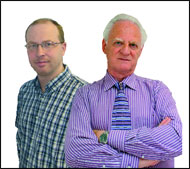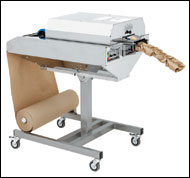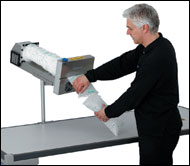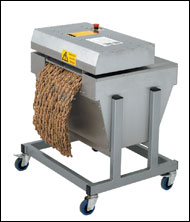 The rise and rise of the Internet and the resurgence of home shopping give cushion packaging a new importance for businesses dispatching goods to consumers. At the same time, growing environmental concerns heighten the need for businesses in all sectors to use ‘greener’ products in transit packaging. Easypack Ltd leads the way in this crucial area, offering a range of cost-effective, top quality solutions involving cushion packaging machinery and consumables, supported by first class sales and service. The user-friendly void fill materials its systems produce are suitable for all industries, and their performance is confirmed by proven results and many contented customers. Easypack’s paper and air-based systems revamp packing productivity, while meeting the growing demand for environmentally safe, biodegradable packaging.
The rise and rise of the Internet and the resurgence of home shopping give cushion packaging a new importance for businesses dispatching goods to consumers. At the same time, growing environmental concerns heighten the need for businesses in all sectors to use ‘greener’ products in transit packaging. Easypack Ltd leads the way in this crucial area, offering a range of cost-effective, top quality solutions involving cushion packaging machinery and consumables, supported by first class sales and service. The user-friendly void fill materials its systems produce are suitable for all industries, and their performance is confirmed by proven results and many contented customers. Easypack’s paper and air-based systems revamp packing productivity, while meeting the growing demand for environmentally safe, biodegradable packaging.
Easypack was founded in the UK in 1992 and has successfully expanded into Europe, with subsidiaries in France, Germany, Holland and Denmark. The company won the prestigious Queens Award for International Trade in 2003, and produces several thousand tonnes of paper packaging per annum, through the numerous Easypack packaging systems in use Europe-wide. Warehouse & Logistics News went to Stevenage, Herts, to find out more about this pace-setting British company.
Tucked away in a modern industrial estate near the A1M, Easypack’s Stevenage location is both the company’s European HQ and the production and warehouse facility for its machines and paper and airbag film consumables. Stevenage also houses the design team responsible for new products and development of the existing product range.
 Easypack was founded by father and son team Roger and Mark Kempster, and now employs 24 people in Stevenage: UK turnover is over £6m, and growing at over 15% PA. We spoke to Tony Moorhouse, Marketing Administrator, and Operations Manager Jason Cox, responsible for the smooth running of Easypack’s production facilities, purchasing, despatch and outside service.
Easypack was founded by father and son team Roger and Mark Kempster, and now employs 24 people in Stevenage: UK turnover is over £6m, and growing at over 15% PA. We spoke to Tony Moorhouse, Marketing Administrator, and Operations Manager Jason Cox, responsible for the smooth running of Easypack’s production facilities, purchasing, despatch and outside service.
It’s a 100% customer-focused operation, explains Tony Moorhouse: “Our sales and service departments are organised to deal with enquiries rapidly, efficiently and professionally. Our sales representatives usually visit the customer to assess the application in detail and advise on the best solution, and offer free trials. In the rare occasion of a service issue, problems can often be solved by phone: if this is not possible, we visit within 24 hours.”
Cushioning the blows
Easypack’s cushion packaging provides a dual role of holding goods firmly in place within the transit box and protecting the product from damage. Tony Moorhouse talked WLN through the concept: “Experience has shown that paper is the best material for this job. It’s resilient, has good shock absorbing qualities and stays firmly in place within the box. It’s also easy to handle, attractive, easy to dispose of after use and is favoured by recipients. A further advantage is that when rolled or coiled, it will hold goods in place without having to fill the whole box, so saving on material, transport and labour costs.”
Paper’s great advantage in cushion packaging, says Tony, is that it provides complete transport protection for goods of any size and weight. Heavy objects are supported on paper rolled into coils, with further coils added, where necessary, to protect the top and four sides.
For the uninitiated, void fill means just that – filling the space in the box in such a way that the goods are not allowed to move, and are fully protected from damage. “Air is the lightest form of packaging,” Tony explains, “provided the air space is controlled.” This is done by containing the air in paper cushions, plastic balloons or polystyrene, or by protecting an air space with paper or cardboard wedges.
 Paper can be used for all round protection of objects of any weight. Airbags are used for top fill for lightweight products. With airbags, exactly the right quantity is required; too little and the goods will move about, too much and the box cannot be closed. Airbags are also prone to damage, either from excessive loading or sharp objects inside or outside the box: if even one airbag is punctured, it can destroy the whole pack’s effectiveness.
Paper can be used for all round protection of objects of any weight. Airbags are used for top fill for lightweight products. With airbags, exactly the right quantity is required; too little and the goods will move about, too much and the box cannot be closed. Airbags are also prone to damage, either from excessive loading or sharp objects inside or outside the box: if even one airbag is punctured, it can destroy the whole pack’s effectiveness.
Easypack’s void fill packaging users are in manufacturing industries and companies selling and distributing goods, says Tony Moorhouse. Manufacturing users include suppliers of mechanical parts for cars, electric motors and controls, electronic components, pneumatic and hydraulic parts, pharmaceuticals, computer products and books.
Easypack has seen the largest business growth in the distribution sector, driven by the increasing number of companies selling goods on-line or from catalogues. A wide variety of products are sent out in cardboard boxes, requiring varying amounts of void fill. User application stories have been written for customers such as Aston Martin, Royal National Lifeboat Institute, Computacenter, Nintendo, Glaxo and Ordnance Survey.
A world class range
Easypack’s current range of products, providing void fill and superior protection for goods in transit, covers the Easypack paper system, Easypack Spiral paper tubes, the Epsilon paper system, the ‘Large Bag’ Cassette system and the cardboard box shredder.
Easypack’s original product, the Easypack paper system, is a freestanding machine that converts rolls of paper into flexible cushions. Cushion width is fixed at around 200 mm, and the length can be selected by dial or footswitch to produce the correct volume for each box. The paper is available in different grades to suit any application, from single ply for light goods to heavy duty, formed from two or three layers on the roll. The machine has been developed to produce a consistent high quality, high bulk pack. It has also been designed for maximum reliability, and breakdowns are a rarity, says Tony. “This is important, not only from the customer’s point of view but also our own, as we are committed to providing free service and maintenance.” Paper is available in natural brown or white, both of which are 100% recycled.
The Epsilon paper system has recently been introduced as a neat, budget priced system for lighter weight products. Cost savings are achieved by producing substantial cushions from single ply brown paper, available in two different grades.
 Easypack Spiral bench mounted machines offer speedy void fill production, suitable for lighter goods. Producing spiral tubes of paper, they are available in either manual or high-speed semi-automatic versions, and lend themselves to intensive workbench operations. The Easypack Cassette produces large volume airbags, whose size and volume can be selected by the packer. This machine has the advantage of being bench-mounted and is offered in manual and semi-automatic versions. The bags are dispensed on demand exactly where required, eliminating the need to store airbags and avoiding the transport problems associated with smaller airbag systems.
Easypack Spiral bench mounted machines offer speedy void fill production, suitable for lighter goods. Producing spiral tubes of paper, they are available in either manual or high-speed semi-automatic versions, and lend themselves to intensive workbench operations. The Easypack Cassette produces large volume airbags, whose size and volume can be selected by the packer. This machine has the advantage of being bench-mounted and is offered in manual and semi-automatic versions. The bags are dispensed on demand exactly where required, eliminating the need to store airbags and avoiding the transport problems associated with smaller airbag systems.
The Easypack Shredder recycles used cardboard boxes into strong flexible packaging material. The resilient packaging material it produces lends itself to heavier items such as car parts, and can be used in conjunction with Easypack paper systems.
All these machines can be used with packing tables/benches, also supplied by Easypack, or to feed paper or airbags directly into boxes on a conveyor line prior to sealing and despatch. Easypack has extensive experience in producing special mounting frames to suit individual customers’ requirements, to make the packing operation as efficient as possible. Overhead hoppers have also been supplied with the Easypack system, allowing the machine to generate large volumes of packaging material, held in a collection basket for immediate take up by packers. This speeds up the whole process.
The technology behind both the Spiral and Cassette systems is unique to Easypack, explains Tony Moorhouse: “Traditional airbags are formed in a continuous strip, perforated at intervals of 100 or 200 mm for tear off by packers. This type of machine is relatively slow, and in most cases needs to run continuously to keep up with demand. Surplus bags have to be stored in large overhead hoppers and transported to packers by means of an air transport system. The Easyair Cassette changes all this, as the bench-mounted machine dispenses exactly the right quantity of void fill, in one piece, straight into the box as required.”
“The Easypack paper system has traditionally been our most popular system,” says Tony Moorhouse, “but is now being complimented by Epsilon, which is economical to run as it produces a bulky pack from single ply paper, suitable for most products.”
All Easypack machines except the Shredder, which is purchased outright, are supplied on monthly rental. The price includes all maintenance, service, operator training and parts, and depends on the quantity of packaging material used. “This is a great deal for customers,” says Tony: “they are not involved in capital expenditure and if their packaging requirements change, they’re not tied to a long contract.”
Payback on the Shredder can be just a few months, depending on the volume of packaging produced, plus the benefit of the cost saving of not having to pay a third party to dispose of surplus cardboard boxes.
 Easypack – your greener solution
Easypack – your greener solution
All Easypack paper, both brown and white, is produced from 100% recycled material. Tony Moorhouse explains: “The recipients of items packed this way are often other industrial companies who re-use the packing material to send out their own goods, or have the facility to bale it with cardboard for further recycling. Individuals can dispose of surplus material at any recycling collection point. In theory, very little of this packaging should end up as landfill, and the material is biodegradable. For the Cassette airbag system, we offer 100% biodegradable film as an alternative to plastic material. This is made from corn starch and fully compostable to EN 13432 standards: the material is completely assimilated by micro-organisms in the ground under the action of heat and moisture, and turned into organic compounds within 13 weeks.”
Easypack’s white paper is carbon neutral and has additional environmental benefits compared with brown, and can be recycled as many as eight times.
The production process itself is similarly efficient, says Tony. Waste generated is burnt to produce steam, which generates electricity, while the remaining low-pressure steam is used to dry the paper. Surplus electrical energy generated is sold back to the National Grid. Ash from the boilers is recycled to produce soil improver, cement and plastic wood suitable for fencing.
Easypack works mainly with European paper mills: “We purchase various grades of readily available recycled material from 44 gsm to 90 gsm, which are combined in several different ways to produce a range of packs suitable for protecting lightweight components through to heavy metal parts.”
Developing a customer solution
Jason Cox is very much involved with developing Easypack’s customer solutions: “Producing a customer solution starts with a site visit by our sales team to obtain a full understanding of the customer’s current and future void fill requirements. We then advise on the best system to use, the number of machines required and the general layout. We follow with a visit from our design team, to measure up and discuss conveyor or bench layouts and design any special frames that may be needed to hold equipment.”
These frames are manufactured from readily available aluminium sections and standard components, to avoid any delays: “Our professional approach, together with our many years’ experience of this type of work, allows us to produce and install equipment to the highest engineering standards in a short time scale.”
Easypack machines are easy for staff to operate, but training in operation and packing techniques is part of the deal, with follow-up training available as required. Ease of paper loading is paramount; 15Kg rolls are slid onto the carrier at waist height, the end of the paper is fed into the drive wheels, and a load button starts the cycle to feed paper through the machine and trim the end ready for use.
“There is no compromise on safety,” says Jason Cox. “Our machines have been designed very much with this in mind, and are fitted with guards and interlock switches to prevent any operator injury.” All Easypack customers large and small have the same service contract to repair and maintain the equipment, and Easypack aim to have an engineer on site within 24 hours of call out.
Easypack – well placed to meet the growing need
Easypack is all set for continued growth, says Tony Moorhouse: “One factor driving demand is the massive increase in consumer purchases of products on the Internet and through mail order, which all need to be shipped. Customers’ purchases can be quite varied and the packing system has to cope with a range of products of all shapes, size and weight, which must arrive on the doorstep in pristine, undamaged condition. Another reason for paying attention to packaging is the high cost of replacing products damaged in transit. Also, we are now finding that a lot of companies want to pack goods in the best eco or environmentally friendly way and are demanding packing materials to meet the criteria for minimum planetary impact.”
Easypack is committed to continuing to develop equipment to meet the demands for void fill cushion packaging, Tony predicts: “We have no doubt that future requirements will reflect the increased need for recycling or composting as landfill sites are reduced. It can only be a question of time before plastic packaging is completely outlawed, and we are ready to help our customers find alternative, workable solutions.”
Easypack Ltd
Tel: 0845 838 0168
Email: info@easypack.net
www.easypack.net




Comments are closed.